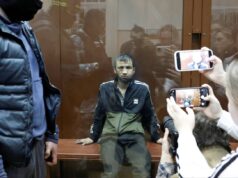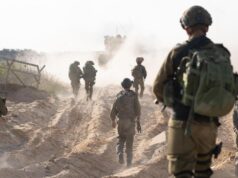Following an Islamic State-linked suicide bombing on July 20th in Urfa, a southern province bordering Syria, Turkey initiated air-strikes on militant positions in Iraq and Syria. Turkey had previously chosen not to act against the Islamic State because IS was fighting Syrian President Bashar Hafez al-Assad and the Kurdistan Workers Party (PKK), Turkey’s longtime enemies.
Turkey’s bombing campaign began on July 24th when jets struck three Islamic State positions near the Syrian border, in what senior government officials described as a preemptive attack. Tanks and artillery from Turkey’s Fifth Armored Brigade positioned within Turkey’s Kilis province also shelled Islamic State militants across the border, killing at least one. Islamic State gunmen attacked a southeastern military outpost, killing one person and wounding five.

Turkish tanks near the Syrian border, where Turkish forces struck at ISIS after an attack. (Photo: AP) |
Turkey also attacked Kurdish PKK positions, creating an awkward situation for the U.S. The PKK is formally seen by the U.S. as a terrorist organization, but it has provided some of the best-trained anti-ISIS fighters. Amid accusations from Kurds that the U.S. traded support of the Kurds for support from Turkey, Ankara announced a new strategy that will permit coalition planes to fly anti-ISIS missions from Turkey, a decision a senior official in Washington call a “game changer.” Ankara had previously ruled out the U.S. military’s use of Incirlik Air Base for launching airstrikes in Syria, harming the U.S. Air Force’s ability to target Islamic State. U.S. Special Forces will also be better positioned to rescue any downed coalition pilots.
At the same time, Ankara announced a new plan to form an “Islamic State Free Zone” in Syria, from which opposition groups can safely command their operations, and the U.S. and Turkey agreed to establish a safe zone extending along the Turkish-Syrian border. Local rebel commanders will oversee and administer the area, which will provide a protected area for Syrian refugees. A senior Obama administration official stated that the goal is to “establish an ISIL-free zone and ensure greater security and stability along Turkey’s border with Syria.”
Ankara’s bombing campaign has sparked criticism from Turkish Kurdish groups that feel they have also been subjected to a crackdown. Local Kurdish activists have been arrested, while others protest Ankara’s airstrikes on Kurdish positions in Iraq. As Turkish leaders and their coalition partners talk at an emergency NATO session in Brussels, senior officials feel emboldened to take on a wide range of adversaries.





